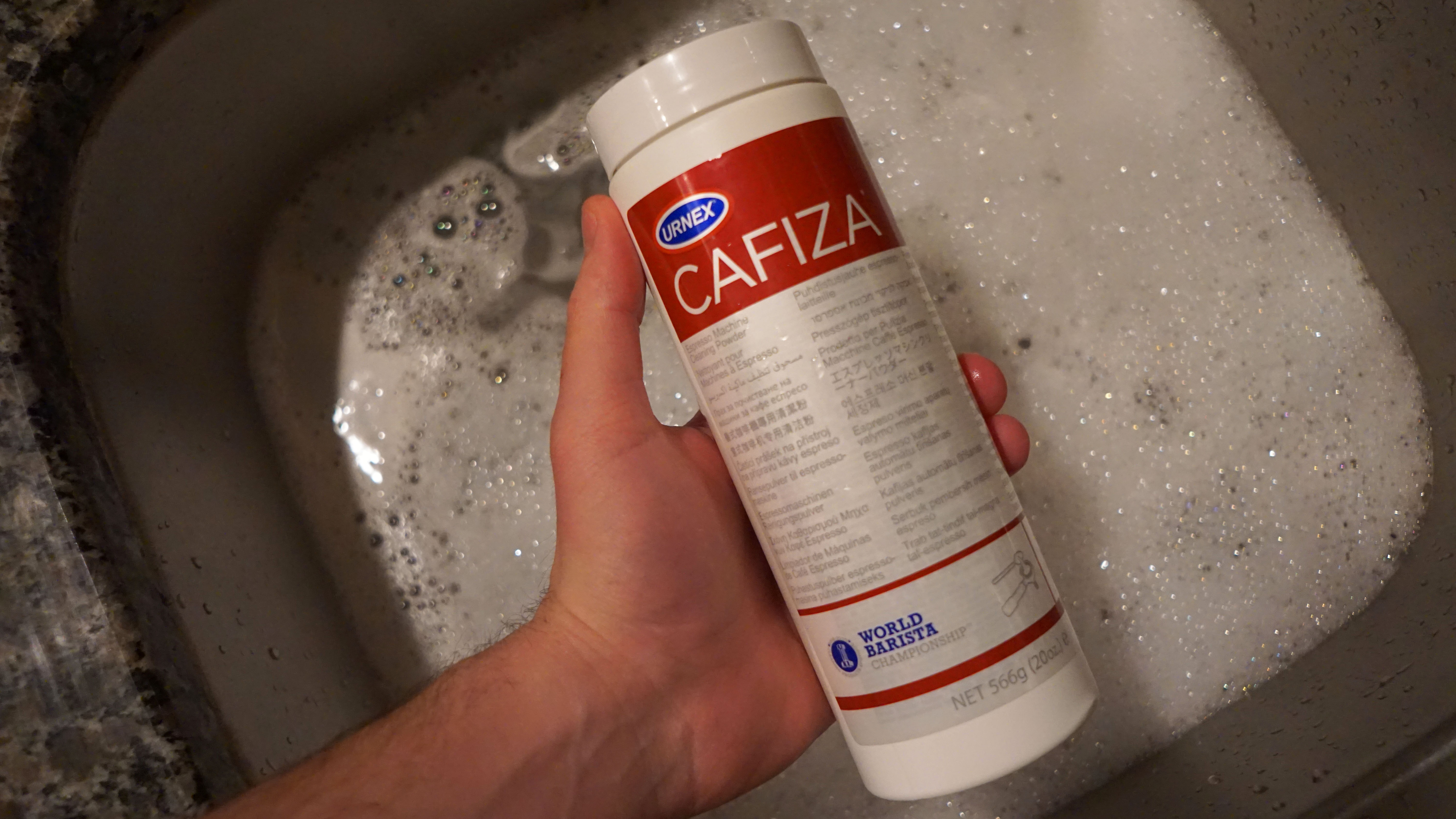Clean Everything Coffee Touches With Cafiza
We may receive a commission on purchases made from links.
On March 8, 2020, I stepped inside a mountainside coffee shop in Jay Peak, Vermont. That hastily made 16 oz of steamin' gas station-quality sludge was the last stranger-made cup of coffee I'd drink for over a year.
Since the onset of COVID, I have been my own barista. Every morning, I drag my little ass out of bed, grind my beans, and set about my pandemic-borne routine. Six tablespoons of grounds in the French press, three cups of water, wait four minutes, plunge, enjoy as much as the circumstances allow. And I'm not alone in my sad ritual. At-home coffee consumption is at an all-time high. 27% of people are now making coffee at home daily, and coffee equipment sales are up 11%. You know what these people don't have that is common in most cafes? Proper cleaning protocols for their coffee equipment.
Urnex Cafiza Powder is the industry standard in clearing espresso machine filters, pumps, and valves. Despite its highly specified use, Cafiza is something of a trade secret cure-all for anything coffee-related. If you're using soap and water to clean your Mr. Coffee, stop. Real coffee heads won't even clean their mugs with normal dish detergent. That's because coffee oils layer quickly on oft-used equipment, and normal washing is not only helpless, but it leaves residue that only enhances the bitter, calcified off-flavors the oils impart. To clear it all, you need a compound that's made specifically to dissolve coffee oils.
Cafiza is an industrial-quality cleaner, made of sodium carbonate, hydrogen peroxide, and sulphamidic acid, explicitly made for cleaning espresso machine parts. Urnex's ace stable of coffee ambassadors revere it for this exact reason, but you don't need to be a World Barista Champion or the owner of a $10,000 Nuova Simonelli machine to reap the benefits of this powerful powder for home use.
Before I got my French press, the primary way I brewed coffee at home was with a Chemex. Instead of using paper filters, I'd bought a washable steel mesh filter that sat atop, holding the grounds while the water passed through. After about a year of daily use, the mesh was clogged with spent coffee grime. By the time my brew sputtered through into the reservoir, it was tepid and tasted like dishwater.
It wasn't long before the French press started taking on the same flavor. The screen began to look like it'd be found at the bottom tributary. That's when a friend suggested I'd been cleaning my gear ineffectively. He pointed me to a 20-oz. supply of Cafiza that would fix all my problems.

As a normal person, I had never heard of Cafiza before, but I was able to get a 20-oz. canister from Seattle Coffee Co. for only $11 (the company also makes dissolvable tabs if math isn't your thing). It arrived about a week later, and the first night, I dissolved 6 grams of powder in a sink full of hot water and threw all the metal parts of my Chemex and French press in, letting them sit for a half hour. A brisk scrub and a rinse later, they were restored to almost new condition. It was like Billy Mays had swooped in and OxyCleaned the mesh. The next batch through the Chemex poured beautifully. The remnants of pre-2020 brews had been dissolved and flushed down the drain. Now, I repeat the regimen every month to make sure I never get so far behind again.
Now, I am bending the barista rules a little bit using a detergent so powerful on such meager coffee tools. But at this point, I'm not some espresso amateur fumbling with my pour-over technique. Since last March, I've made a Starbucks worth of java, and professional problems necessitate professional solutions.
Urnex is incredibly prescriptive in its instructions to users, and the company offers distinct products for countertop machines. a product called Clearly Coffee is intended for glass and stainless steel and another called Tabz is for standard drip makers. But don't let the persnickety product designations deter you, Cafiza is the most versatile cleaner in Urnex's catalog. You can use it to descale your Keurig. Food & Wine even endorsed Cafiza as a solution for dingy wine decanters. The one unquestioned limitation is that you should never use Cafiza on aluminium—so find another solution for your stained Bialetti. But for everything else, there's Cafiza, the declassified solution to just about every damn coffee issue in your home cafe.
